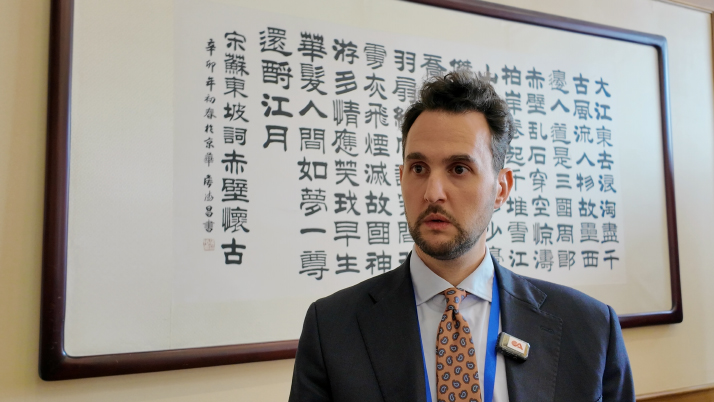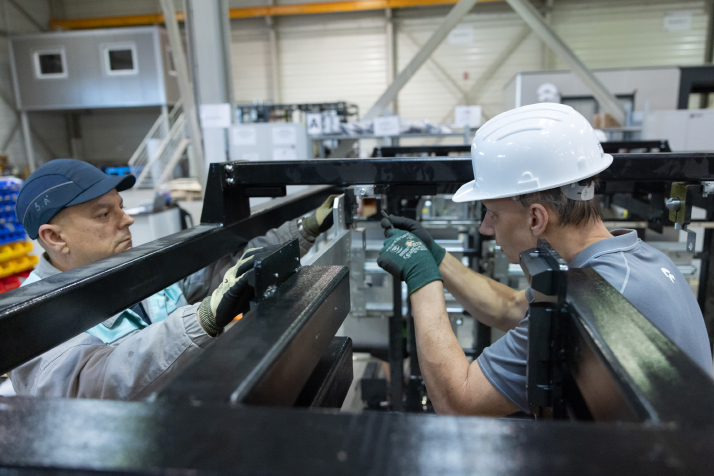| Voice |
| Revitalizing relations | |
|
|
 George N. Tzogopoulos
In 2023, China and the European Union celebrated the 20th anniversary of their comprehensive strategic partnership. After a hiatus due to the impact of the COVID-19 pandemic, full-scale exchange and dialogue have now resumed across all levels between China and this political and economic union of 27 European countries. In an exclusive interview with Beijing Review, George N. Tzogopoulos, EU-China Program Director at the Centre International de Formation Européenne, an independent institute of higher education and research in Nice, France, shared his views on China’s innovation and growth, Sino-EU relations and economic collaboration, as well as on how regional conflicts affect the world. Edited excerpts of their conversation follow: Beijing Review: China has been developing new quality productive forces, which emphasize technological innovation and industrial upgrades. What's your understanding of this concept and China's innovation drive on the whole? George N. Tzogopoulos: China's modernization is a dynamic, evolving process, with shifting priorities to address contemporary challenges. In recent years, the focus has increasingly shifted toward enhancing quality, particularly in response to imperatives like sustainable development. Technological advancement and innovation are crucial for this transformation. Therefore, with the new quality productive forces, China will aim to place more emphasis on research and development to foster innovation and unlock the vast potential of its market. This strategic emphasis not only aims to spur growth under new conditions—such as those posed by sustainable development and climate change—but also promotes a transition toward green energy and sustainable practices. (In the larger context of China's economic development, the concept of new quality productive forces refers to initiatives aimed at enhancing productivity, innovation, sustainability and quality in different sectors of the economy through technological innovation and digital transformation—Ed.) On April 7, China's Minister of Commerce Wang Wentao headed a delegation of Chinese new-energy vehicle (NEV) companies to Paris, capital of France. He stressed to European countries that China does not give state subsidies to the country's NEV makers and constant innovations are the core competitiveness of these companies. Do you think this will ease the trade dispute between China and Europe? Sino-EU relations are advancing rapidly, presenting numerous challenges that both parties are actively addressing. Notably, China's burgeoning success in the electric vehicle industry has raised concerns in Europe, particularly regarding what some Europeans perceive as the overcapacity of the Chinese market. Consequently, the two regions are engaging in discussions aimed at forging mutually beneficial solutions. This dynamic is not unprecedented in EU-China trade negotiations, a similar scenario previously unfolded with solar panels. Given this history, there is optimism that ongoing negotiations will yield effective solutions. It is entirely natural that despite existing disagreements, there is a shared willingness on both sides to explore how differences can be bridged. Therefore, we can remain optimistic that despite the challenges, the path forward will be conducive to the interests of both parties. U.S. Secretary of Treasury Janet Yellen visited China in early April and stressed in a speech that decoupling would be disastrous for both economies. China and the EU have been important trading partners for decades. What is your understanding of the challenges and opportunities in future China-EU economic cooperation? From a European perspective, it is highly encouraging to see China and the United States engaging in dialogue. Recent developments, including numerous American delegations visiting China and the practical implementation of the San Francisco Vision, signify positive momentum. (Chinese President Xi Jinping and U.S. President Joe Biden engaged in a four-hour summit on November 15, 2023, in San Francisco, California. There, they established the San Francisco Vision for the future direction of a healthy, stable and sustainable development of bilateral relations—Ed.) Such interaction is crucial for the world and the EU, as it attempts to foster stability within the international system. Without these collaborative efforts, hopes for global peace and prosperity would diminish. It is a constructive period and the EU is adjusting its policies toward China. Although the COVID-19 pandemic was a period marked by more disagreements than agreements, the recent increase in meetings between European and Chinese policymakers shows a mutual commitment to exploring how far both sides can progress together. The prevailing EU policy is framed as a "de-risking strategy." This does not aim for decoupling but seeks to reduce dependencies where feasible. This concept currently dominates EU discourse. I find dialogue extremely important; the EU, as a key player in the international system, values cooperation and views China as a significant partner in enhancing multilateralism and global stability. One of the principal causes of disagreements and misunderstandings during the pandemic was the absence of in-person contact. Now that this barrier has been lifted, there is a renewed opportunity for people-to-people exchange and an increase in tourist flows. We are now able to visit China again, as well as other parts of the world. I have taken particular note of the new visa relaxation policies introduced by the Chinese Government. Under this new scheme, citizens from various countries can enter and stay in China for approximately two weeks without a visa. The most recent European countries to benefit from it include Switzerland, Ireland, Hungary and three more. This policy is not only convenient but also underscores the importance China places on fostering people-to-people exchange. This type of exchange is crucial in addressing and resolving misunderstandings, and in exploring ways to overcome these challenges effectively.  Staff members work at the NIO Power Europe Plant in Biatorbagy, Hungary, on March 18. A European hub for manufacturing, servicing and research, this facility plays a role in advancing the electric vehicle (EV) innovations of Chinese EV manufacturer NIO (XINHUA)
Recently, high-ranking officials from different countries have been visiting Beijing. Political experts have explained that this trend is the result of increasing regional conflicts around the world. Do you agree? Which problem do you think is the most urgent one to be addressed? The conflict in Ukraine, now in its third year, continues to have devastating impacts not only on those directly involved but also on the global economy. Europe, close to the conflict and Russia, feels these effects acutely. The region's energy dependence on Russia, along with inflation and rising prices, are significant repercussions. As long as the conflict persists, its impact on a globalized European economy is inevitable. Although there appears to be some stabilization in prices, numerous challenges and obstacles remain. From a European perspective, the conflict must end as soon as possible, allowing for peace and stability to return to the continent. This situation is catastrophic, influencing the EU's worldview and its diplomatic and economic strategies. The COVID-19 pandemic has demonstrated that today's challenges are transnational, making it difficult for any single country to address these issues alone. Moreover, the recent terrorist attack in Moscow highlights that terrorism, like the pandemic, is a global problem affecting cities worldwide. This underscores the critical need for global collaboration. Climate change serves as yet another poignant example of such challenges. Given these circumstances, finding a way forward to contribute to global peace and stability becomes paramount. In this context, China's role is especially significant. As the world's second largest economy, China is rapidly expanding its influence in both geoeconomics and geopolitics, positioning it as a crucial player in fostering global multilateralism. The EU and China, therefore, have vital roles to play in ensuring the stability of this multilateral order. Copyedited by Elsbeth van Paridon Comments to dingying@cicgamericas.com |
|
||||||||||||||||||||||||||||||
|
